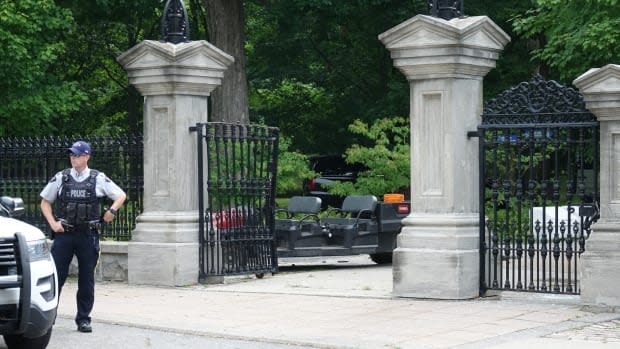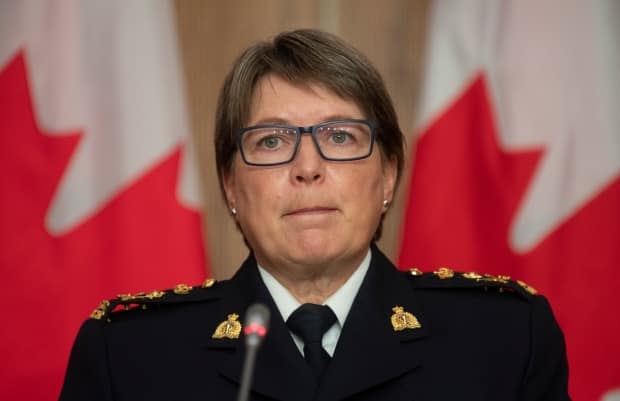RCMP commissioner vowed to change how Mounties handle threats against politicians

The head of the RCMP told Public Safety Minister Bill Blair last year that Mounties need to do a better job of responding to threats against politicians.
"In recent months, the RCMP has recognized that the assessment and management of non-criminal threats must be ameliorated," RCMP Commissioner Brenda Lucki said in a briefing note sent to the minister on Aug. 27, 2020. The note was obtained by CBC News through an access to information request.
Lucki sent the note following last July's security incident at the Rideau Hall grounds in Ottawa, where Prime Minister Justin Trudeau and his family live. Corey Hurren pleaded guilty in February to storming the gates of Rideau Hall with loaded firearms and multiple rounds of ammunition.
On Sept. 25, 2020, a man accosted NDP Leader Jagmeet Singh on Parliament Hill and attempted to perform a "citizen's arrest."
WATCH: Jagmeet Singh discusses harassment incident
Just this week, B.C. Conservative MP Todd Doherty tweeted out a video saying someone had threatened his family.
"I want to send a message. I don't run and I don't hide. You threaten my family, you approach my family, and I will take appropriate action. That's not a threat. That's a promise," he said.
Doherty declined to describe the nature of the threat and told CBC the matter is now in the hands of the authorities.
A spokesperson for the RCMP said the number of threats made against Prime Minister Trudeau and the federal cabinet spiked significantly last year.
The RCMP's protective policing unit reported about 229 files for the prime minister and 89 files for the cabinet ministers in 2020.
Already this year there has been about 74 files for the prime minister and 19 files for the ministers.
The RCMP said it runs general threat assessments for the prime minister and for cabinet ministers — sometimes based on the nature of an individual minister's work.
"For example, [Health Minister Patty] Hajdu was included as a result of the COVID situation," Lucki said in the briefing note.
Hajdu's spokesperson Cole Davidson said her office couldn't discuss security issues.
"Everyone deserves to feel safe where they live and work, and there is no place in our society for threats," he said.
Trolled on the trail
Chris Tenove is a postdoctoral research fellow in political science at the University of British Columbia and worked on the report "Trolled on the Campaign Trail: Online Incivility and Abuse in Canadian Politics." He helped to analyze more than one million tweets directed at political candidates during the 2019 federal election and interviewed candidates, campaign staff and elected officials.
The report concluded that about 40 per cent of tweets directed at candidates were uncivil, while 16 per cent were abusive or potentially threatening.
Some of the people Tenove and his fellow researchers interviewed reported mixed experiences with police responses.
"It can be very hard to tell often what is a real threat and what isn't," he said. "In some cases police have been dismissive, or people have experienced them as being dismissive to what they feel is threatening behaviour and didn't feel like it was given the consideration it warranted."
Some reported that police in some jurisdictions took the threats seriously, while other officers chalked it up to "people can be jerks online," said Tenove.
"People are looking for more robust and systemic attention to the threats they face."

Lucki wrote to Blair to say that the force has taken steps to improve its "responsiveness" and has improved the way it assesses situations.
The details of those changes were redacted in the document released to CBC News for security reasons.
"The RCMP determined that we needed to do more to understand the concerns, raised by elected official as a result of the threats and offensive actions, and to work with our partners to ensure there was an aligned response to the activity that is having such an impact on protectees," said RCMP spokesperson Robin Percival in an email to CBC News.
"The RCMP also developed a pilot program in which RCMP officers communicate regularly with the federal ministerial offices to assist with greater assessment and awareness across all security agencies. The program staff engage directly with protectees and their chiefs of staff to ensure: gaps in communication are reduced; concerns are understood; services available and where to get them is understood; and, to adapt our service delivery to the realities of the environment."
Tenove said threats and harassing messages make it difficult for politicians to do their jobs.
"It makes it harder to do some of things we want politicians to do — which is [to] be able to engage with and listen to and even meet without fear [with] members of the public," he said.
For example, Tenove said, some politicians might shun social media because of the online vitriol, or might limit their face-to-face encounters with the people they represent.
"A number of cabinet ministers were warned — 'Don't give so much warning about whether you're going to give a public event' — because doing that allows people to plan actions," he said.
"There's just these things that make it harder to run for office but also to be a good, elected democratic representative."
Threats could deter candidates, says critic
NDP public safety critic Jack Harris said politicians need adequate protection from the RCMP — "not because of who they are, but because of what they're doing."
"These things are important issues of democracy," he said. "[Police are] supposed to be the experts in all of this and the fact that they acknowledge their own efforts were not adequate is a little worrisome."
Harris said it's a problem if such threats deter people from running for office — especially women and people of colour.
"It discourages some people enough to not want to do it. It also discourages people out there who might otherwise want to do it, if they're going to be subject to that kind of treatment. And in fact, it's intended to do that," he said.
"People who do that are seeking to intimidate, or want people to feel afraid."
In 2019, when he was still clerk of the Privy Council, Michael Wernick told a parliamentary committee that he was growing more and more alarmed about the prospect of political violence in Canada, pointing to the growing use of words like "treason" and "traitor" in political discourse.
"Those are the words that lead to assassination," Wernick said. "I'm worried that somebody's going to get shot this year during the political campaign."

